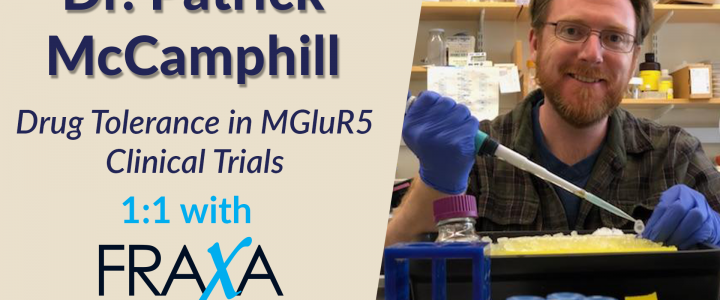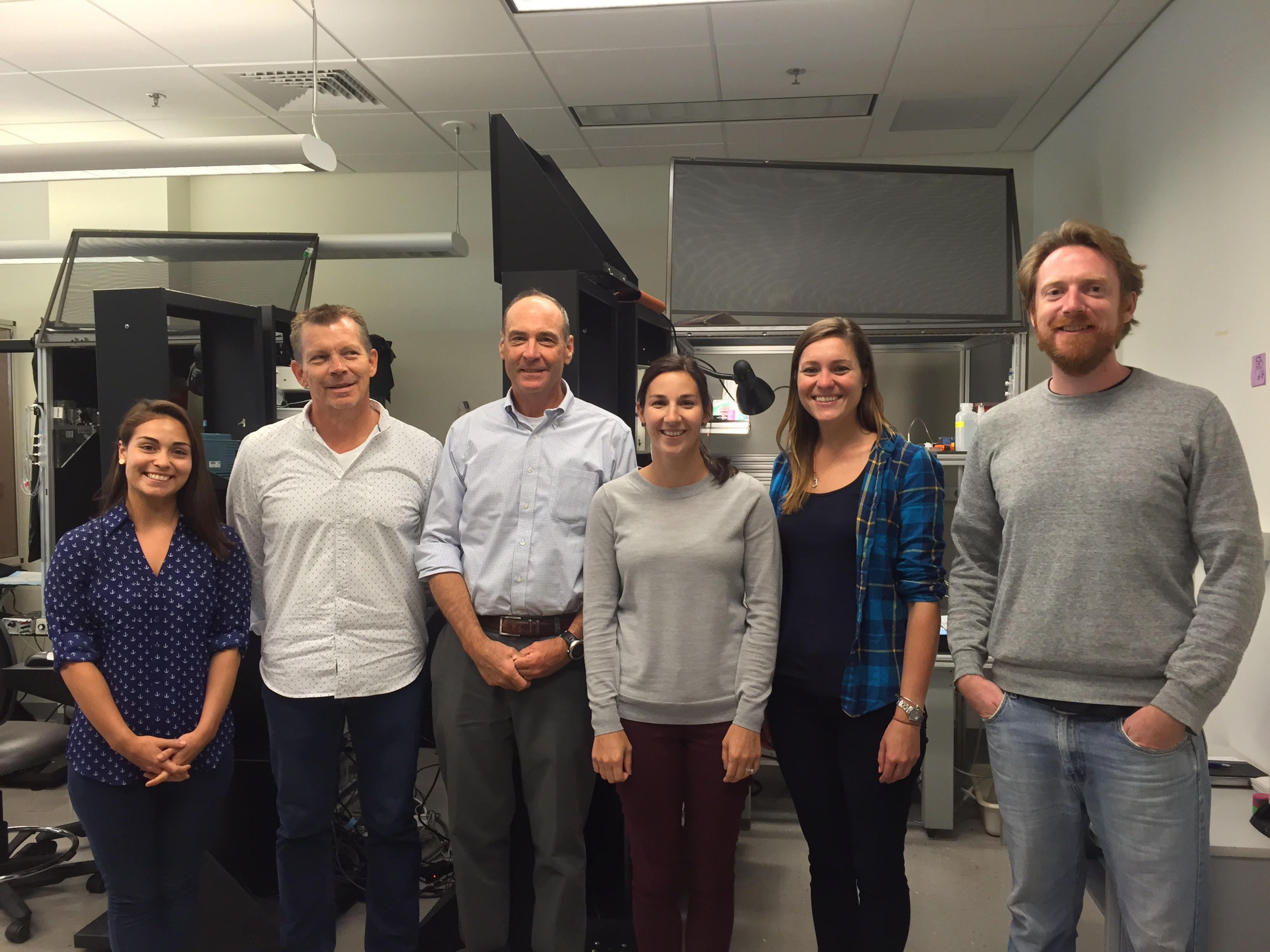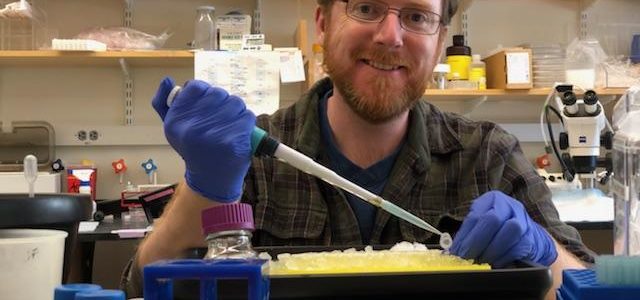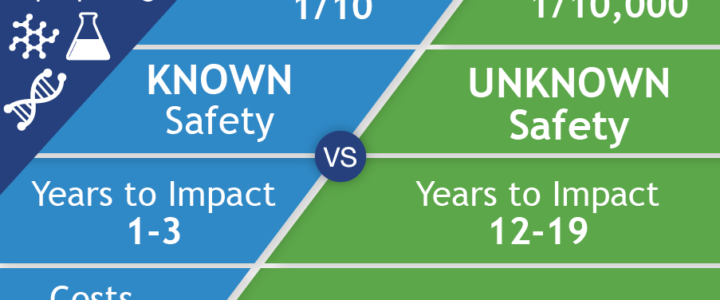The research team of Brian Christie, PhD and Marie-Eve Tremblay is developing ways to balance hormones, including drugs like metformin and changes in diet, which could not only reduce hunger and obesity, but ultimately also improve learning and behavior in Fragile X syndrome.
Read moreGSK3
Drug Tolerance in MGluR5 Clinical Trials – Dr Patrick McCamphill 1:1 with FRAXA

We have long suspected that the clinical trials of mGluR5 blockers from Novartis and Roche failed because the drug triggered tolerance, losing effect over time. With a $90,000 grant from FRAXA, Dr. Patrick McCamphill, a Postdoctoral Fellow in the MIT lab of Dr. Mark Bear, is investigating. He does indeed find tolerance, and now he is looking for ways to overcome it.
Read moreScientists Find a New Way to Reverse Symptoms of Fragile X

FRAXA Investigator and MIT Professor Mark Bear and his colleagues have identified a valuable new target for Fragile X therapeutics: GSK3 alpha. Several FRAXA research teams previously identified GSK3 beta as a treatment target for Fragile X. The catch is that, so far, GSK3 beta inhibitors have proven too toxic for regular use. Dr. Bear’s new discovery opens up the possibility of developing more selective compounds with less toxicity and fewer side effects. Interestingly, lithium inhibits both GSK3 versions – alpha and beta.
Read morePharmacological Tolerance in the Treatment of Fragile X Syndrome

With a $90,000 grant from FRAXA Research Foundation over 2018-2019, Dr. Patrick McCamphill, postdoctoral fellow in Dr. Mark Bear’s lab at Massachusetts Institute of Technology (MIT), is investigating drug tolerance to mGluR5 antagonists, arbaclofen, and other potential Fragile X treatments. He is also exploring ways to overcome it.
Read moreAltered Neural Excitability and Chronic Anxiety in a Mouse Model of Fragile X

With a $35,000 grant from FRAXA Research Foundation in 2016, Dr. Peter Vanderklish at Scripps Research Institute, and colleagues, explored the basis of anxiety in Fragile X syndrome.
Read moreRepurposing Available Drugs to Treat Fragile X Syndrome – FRAXA Initiatives

FRAXA Research Foundation was founded in 1994 to fund biomedical research aimed at finding a cure for Fragile X syndrome and, ultimately, autism. We prioritize translational research with the potential to lead to improved treatments for Fragile X in the near term. Our early efforts involved supporting a great deal of basic neuroscience to understand the cause of Fragile X. By 1996, these efforts had already begun to yield results useful for drug repurposing. To date, FRAXA has funded well over $25 million in research, with over $3 million of that for repurposing existing drugs for Fragile X.
Read moreTargeting AMP-Activated Protein Kinase Pathway in Fragile X Syndrome

With a $100,000 grant from the FRAXA Research Foundation in 2015, Dr. Peter Vanderklish explored a novel strategy to treat Fragile X syndrome: AMPK activators. The good news is that there are FDA approved (for example, metformin) and naturally occurring AMPK activators (such as resveratrol, found in red wine).
Read moreBryostatin Restores Learning and Memory in Adult Fragile X Mice

A bizarre marine critter found off the California coast — Bugula neritina— is the only known source of a potential new Fragile X treatment, Bryostatin. Last month, FRAXA sat down with scientists from Neurotrope BioScience, a specialty biopharmaceutical company developing medicines for rare diseases and Alzheimer’s based on Bryostatin. Their Fragile X program is based on research by a West Virginia team led by Daniel Alkon, MD, which showed that Bryostatin-1 restores hippocampal synapses and spatial learning and memory in adult Fragile X mice.
Read moreGlycogen Synthase Kinase-3 (GSK3), Lithium and Fragile X

With $208,000 in funds from FRAXA Research Foundation, Dr. Richard Jope and his team at the University of Miami tested whether newly developed, highly specific inhibitors of GSK3 can reduce behavioral abnormalities in Fragile X mice.
Read moreWhat Works, and What Doesn’t
At the start, it’s always hard to know what methods will work best for something as complex as the development of disease-modifying treatments for Fragile X. But, we’ve always tried to let the science lead us down the right path. At this point, the results are unequivocal, and they have shaped how we are looking for the Next Great Thing in Fragile X treatments.
Read moreSmall Molecule Modulators of Lithium for Treatment of Fragile X Syndrome

With a $219,500 grant from FRAXA Research Foundation, Dr. Stephen Haggarty from Havard/MIT developed a high-throughput drug screen to find compounds that inhibit GSK3, a critical enzyme in Fragile X. He looked for compounds that can accomplish this either alone or in combination with lithium, offering the possibility of enhancing the effectiveness of lithium as a treatment. His drug screen used patient-specific neural progenitor (NP) cells derived from human induced pluripotent stem cells (iPSCs) – which are created from cells in a skin biopsy from people with Fragile X syndrome (FXS) and other autism spectrum disorders.
Read moreTransgenic Mouse Models of Fragile X Syndrome

With $736,000 in grants from FRAXA Research Foundation over 2000-2007, Dr. Robert Bauchwitz at Columbia University developed 15 transgenic mouse models of Fragile X syndrome, using them to evaluate a range of experimental treatments. Results published.
Read more
